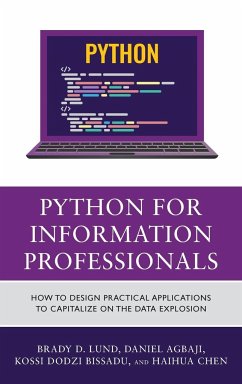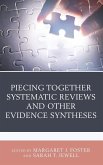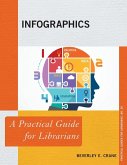Brady Lund, Daniel Agbaji, Kossi Dodzi Bissadu
Python for Information Professionals
How to Design Practical Applications to Capitalize on the Data Explosion
Brady Lund, Daniel Agbaji, Kossi Dodzi Bissadu
Python for Information Professionals
How to Design Practical Applications to Capitalize on the Data Explosion
- Gebundenes Buch
- Merkliste
- Auf die Merkliste
- Bewerten Bewerten
- Teilen
- Produkt teilen
- Produkterinnerung
- Produkterinnerung
Python for Information Professionals: How to Design Practical Applications to Capitalize on the Data Explosion is an introduction to the Python programming language for library and information professionals with little or no prior experience.
Andere Kunden interessierten sich auch für
![Piecing Together Systematic Reviews and Other Evidence Syntheses Piecing Together Systematic Reviews and Other Evidence Syntheses]() Piecing Together Systematic Reviews and Other Evidence Syntheses84,99 €
Piecing Together Systematic Reviews and Other Evidence Syntheses84,99 €![Infographics Infographics]() Beverley E. CraneInfographics86,99 €
Beverley E. CraneInfographics86,99 €![Simple Positive Play at the Library Simple Positive Play at the Library]() Jennifer IlardiSimple Positive Play at the Library78,99 €
Jennifer IlardiSimple Positive Play at the Library78,99 €![Beyond Books Beyond Books]() Jenn CarsonBeyond Books46,99 €
Jenn CarsonBeyond Books46,99 €![Simple Book Repair Techniques Simple Book Repair Techniques]() Donia ConnSimple Book Repair Techniques43,99 €
Donia ConnSimple Book Repair Techniques43,99 €![Young Adult Library Services Young Adult Library Services]() Young Adult Library Services35,99 €
Young Adult Library Services35,99 €![Using Technology in the Library Workplace Using Technology in the Library Workplace]() Marie Keen ShawUsing Technology in the Library Workplace87,99 €
Marie Keen ShawUsing Technology in the Library Workplace87,99 €-
-
-
Python for Information Professionals: How to Design Practical Applications to Capitalize on the Data Explosion is an introduction to the Python programming language for library and information professionals with little or no prior experience.
Produktdetails
- Produktdetails
- Verlag: Rowman & Littlefield
- Seitenzahl: 172
- Erscheinungstermin: 1. November 2023
- Englisch
- Abmessung: 235mm x 157mm x 14mm
- Gewicht: 404g
- ISBN-13: 9781538178249
- ISBN-10: 1538178249
- Artikelnr.: 68284016
- Herstellerkennzeichnung
- Libri GmbH
- Europaallee 1
- 36244 Bad Hersfeld
- gpsr@libri.de
- Verlag: Rowman & Littlefield
- Seitenzahl: 172
- Erscheinungstermin: 1. November 2023
- Englisch
- Abmessung: 235mm x 157mm x 14mm
- Gewicht: 404g
- ISBN-13: 9781538178249
- ISBN-10: 1538178249
- Artikelnr.: 68284016
- Herstellerkennzeichnung
- Libri GmbH
- Europaallee 1
- 36244 Bad Hersfeld
- gpsr@libri.de
Brady Lund, Ph.D., is an assistant professor of information science at the University of North Texas. He has published four books related to technology in libraries and educational institutions - including Casting Light on the Dark Web and Creating Accessible Online Instruction Using Universal Design Principles, both for Rowman and Littlefield Publishing - and nearly 100 articles, editorials, and opinion papers. His work often combines data analytics principles with library and information science research topics. Daniel Agbaji is a Ph.D. student in information science at the University of North Texas, with a major in Data Science-Artificial Intelligence and Machine Learning. As an experienced researcher and software developer, he has written scholarly publications and book chapters with notable publishers. Daniel has published articles in the information science and library field. As a software developer, Daniel has written thousands of lines of code for fortune 500 companies which are not publicly available due to company policies. Kossi Dodzi Bissadu is a Ph.D. student in the computer science at the University of North Texas. He currently works as a software engineer at Zenner USA where he leads various products, software, applications, and systems development projects. He is also a US Air Force veteran, very talented and dedicated professional who has more than ten-year professional record achievements, and demonstrated success leading, managing, and working in Technology and Sciences. Kossi has several industry certifications including certified blockchain developer, AWS certified cloud practitioner, and CompTIA Security+. Haihua Chen, Ph.D., is an assistant professor of information science at the University of North Texas. He has more than ten years of experience in Python and five years of experience in teaching technical courses for information science and data science students using Python. Dr. Chen has published nearly 40 articles on natural language processing, machine learning, data quality, information retrieval, digital libraries, and applied data science. He is the editor of The Electronic Library and the leading guest editor of Frontiers in Big Data and Information Discovery & Delivery special issues. He is also serving as the reviewer/ PC member for more than 20 peer-review journals/ conferences in information science and computer science.
Preface
Part I: Python: The Basics
Chapter 1 - The Python WorkspaceChapter 2 - Object Oriented
ProgrammingChapter 3 - Data Types, Structures, Sets and AlgorithmsChapter 4
- Functions: Code that Puts Our Data to WorkChapter 5 - Importing,
Creating, and Maintaining Data FilesChapter 6 - Testing and
TroubleshootingPart II: Further Applications of Python in Information
Organizations
Chapter 7 - Library Management and Usage DataChapter 8 - Library Research
Data ManagementChapter 9 - Text AnalysisChapter 10 - Library and
Information Science ResearchChapter 11 - Artificial Intelligence
ApplicationsPart III: Practical and Ethical Considerations for Using Python
Chapter 12 - Data Explosion, Big Data, and Data LiteracyChapter 13 - Data
EthicsChapter 14 - Knowledge and Data EconomyChapter 15 - Further Resources
for Advancing Your Python Mastery Glossary
Index
About the Author
Part I: Python: The Basics
Chapter 1 - The Python WorkspaceChapter 2 - Object Oriented
ProgrammingChapter 3 - Data Types, Structures, Sets and AlgorithmsChapter 4
- Functions: Code that Puts Our Data to WorkChapter 5 - Importing,
Creating, and Maintaining Data FilesChapter 6 - Testing and
TroubleshootingPart II: Further Applications of Python in Information
Organizations
Chapter 7 - Library Management and Usage DataChapter 8 - Library Research
Data ManagementChapter 9 - Text AnalysisChapter 10 - Library and
Information Science ResearchChapter 11 - Artificial Intelligence
ApplicationsPart III: Practical and Ethical Considerations for Using Python
Chapter 12 - Data Explosion, Big Data, and Data LiteracyChapter 13 - Data
EthicsChapter 14 - Knowledge and Data EconomyChapter 15 - Further Resources
for Advancing Your Python Mastery Glossary
Index
About the Author
Preface
Part I: Python: The Basics
Chapter 1 - The Python WorkspaceChapter 2 - Object Oriented
ProgrammingChapter 3 - Data Types, Structures, Sets and AlgorithmsChapter 4
- Functions: Code that Puts Our Data to WorkChapter 5 - Importing,
Creating, and Maintaining Data FilesChapter 6 - Testing and
TroubleshootingPart II: Further Applications of Python in Information
Organizations
Chapter 7 - Library Management and Usage DataChapter 8 - Library Research
Data ManagementChapter 9 - Text AnalysisChapter 10 - Library and
Information Science ResearchChapter 11 - Artificial Intelligence
ApplicationsPart III: Practical and Ethical Considerations for Using Python
Chapter 12 - Data Explosion, Big Data, and Data LiteracyChapter 13 - Data
EthicsChapter 14 - Knowledge and Data EconomyChapter 15 - Further Resources
for Advancing Your Python Mastery Glossary
Index
About the Author
Part I: Python: The Basics
Chapter 1 - The Python WorkspaceChapter 2 - Object Oriented
ProgrammingChapter 3 - Data Types, Structures, Sets and AlgorithmsChapter 4
- Functions: Code that Puts Our Data to WorkChapter 5 - Importing,
Creating, and Maintaining Data FilesChapter 6 - Testing and
TroubleshootingPart II: Further Applications of Python in Information
Organizations
Chapter 7 - Library Management and Usage DataChapter 8 - Library Research
Data ManagementChapter 9 - Text AnalysisChapter 10 - Library and
Information Science ResearchChapter 11 - Artificial Intelligence
ApplicationsPart III: Practical and Ethical Considerations for Using Python
Chapter 12 - Data Explosion, Big Data, and Data LiteracyChapter 13 - Data
EthicsChapter 14 - Knowledge and Data EconomyChapter 15 - Further Resources
for Advancing Your Python Mastery Glossary
Index
About the Author









